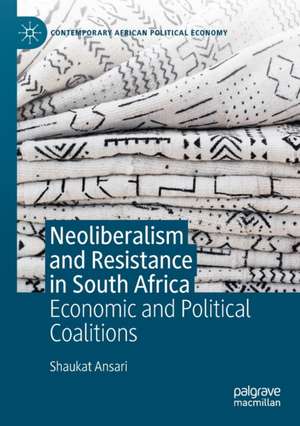Neoliberalism and Resistance in South Africa: Economic and Political Coalitions: Contemporary African Political Economy
Autor Shaukat Ansarien Limba Engleză Paperback – 4 mai 2022
This book critically examines the persistence of market orthodoxy in post-apartheid South Africa and the civil society resistance such policies have generated over a twenty-five-year period. Each chapter unpacks the key political coalitions and economic dynamics, domestic as well as global, that have sustained neoliberalism in the country since the transition to liberal democracy in 1994. Chapter 1 analyzes the political economy of segregation and apartheid, as well as the factors that drove the democratic reform and the African National Congress’ (ANC) subsequent abandonment of redistribution in favor of neoliberal policies. Further chapters explore the causes and consequences of South Africa’s integration into the global financial markets, the limitations of the post-apartheid social welfare program, the massive labour strikes and protests that have erupted throughout the country, and the role of the IMF and World Bank in policymaking. The final chapters also examine the political and economic barriers thwarting the emergence of a viable post-apartheid developmental state, the implications of monopoly capital and foreign investment for democracy and development, and the phenomenon of state capture during the Jacob Zuma Presidency.
| Toate formatele și edițiile | Preț | Express |
|---|---|---|
| Paperback (1) | 633.84 lei 6-8 săpt. | |
| Springer International Publishing – 4 mai 2022 | 633.84 lei 6-8 săpt. | |
| Hardback (1) | 639.25 lei 6-8 săpt. | |
| Springer International Publishing – 4 mai 2021 | 639.25 lei 6-8 săpt. |
Preț: 633.84 lei
Preț vechi: 745.70 lei
-15% Nou
Puncte Express: 951
Preț estimativ în valută:
121.28€ • 126.97$ • 100.36£
121.28€ • 126.97$ • 100.36£
Carte tipărită la comandă
Livrare economică 05-19 aprilie
Preluare comenzi: 021 569.72.76
Specificații
ISBN-13: 9783030697686
ISBN-10: 3030697681
Ilustrații: XI, 180 p. 8 illus.
Dimensiuni: 148 x 210 mm
Greutate: 0.24 kg
Ediția:1st ed. 2021
Editura: Springer International Publishing
Colecția Palgrave Macmillan
Seria Contemporary African Political Economy
Locul publicării:Cham, Switzerland
ISBN-10: 3030697681
Ilustrații: XI, 180 p. 8 illus.
Dimensiuni: 148 x 210 mm
Greutate: 0.24 kg
Ediția:1st ed. 2021
Editura: Springer International Publishing
Colecția Palgrave Macmillan
Seria Contemporary African Political Economy
Locul publicării:Cham, Switzerland
Cuprins
Chapter 1: Financialization as a New Regime of Accumulation: Business, Apartheid, and the Neoliberal Transition.- Chapter 2: Bureaucratic Fragmentation, Cash-Transfers, and Financial Markets: Policymaking in the Post-Apartheid Neoliberal Landscape.- Chapter 3: Political Resistance to Neoliberalism: Cracks in the Post-Apartheid Corporatist Arrangement.- Chapter 4: Early Forms of State Resistance to Neoliberalism: The International Monetary Fund in South Africa.- Chapter 5: Forging a Developmental State in Post-Apartheid South Africa: A Comparative Analysis of the Structural and Political Barriers to Industrialization.- Chapter 6: Conclusion.
Notă biografică
Shaukat Ansari received his PhD in Political Science from the University of Toronto, Canada, and has published in several peer-reviewed journals, including African Affairs, Review of Political Economy, and International Critical Thought.
Textul de pe ultima copertă
This book critically examines the persistence of market orthodoxy in post-apartheid South Africa and the civil society resistance such policies have generated over a twenty-five-year period. Each chapter unpacks the key political coalitions and economic dynamics, domestic as well as global, that have sustained neoliberalism in the country since the transition to liberal democracy in 1994. Chapter 1 analyzes the political economy of segregation and apartheid, as well as the factors that drove the democratic reform and the African National Congress’ (ANC) subsequent abandonment of redistribution in favor of neoliberal policies. Further chapters explore the causes and consequences of South Africa’s integration into the global financial markets, the limitations of the post-apartheid social welfare program, the massive labour strikes and protests that have erupted throughout the country, and the role of the IMF and World Bank in policymaking. The final chapters also examine the political and economic barriers thwarting the emergence of a viable post-apartheid developmental state, the implications of monopoly capital and foreign investment for democracy and development, and the phenomenon of state capture during the Jacob Zuma Presidency.
Shaukat Ansari received his PhD in Political Science from the University of Toronto, Canada, and has published in several peer-reviewed journals, including African Affairs, Review of Political Economy, and International Critical Thought.
Caracteristici
Investigates why the African National Congress government persists with a set of economic policies that fail to alleviate gross socio-economic inequalities and unemployment Analyzes the government's use of cash transfer and social grants policies to assist impoverished South African citizens Illustrates how local commitments to greater equality and socio-economic opportunity are undermined by the power of the global financial markets












